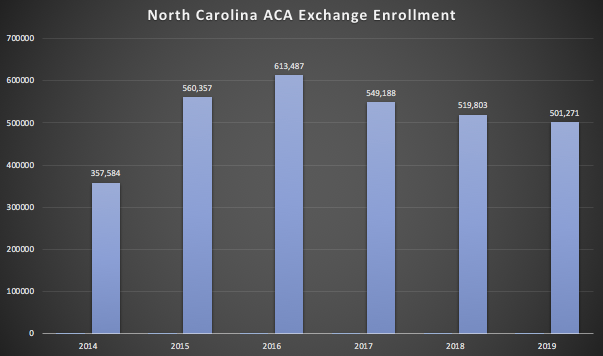Medicaid expansion has been one of the most intensely debated topics at the North Carolina General Assembly this session. My colleagues and I at the John Locke Foundation believe this would be a financially reckless move, which would do nothing for the root causes of why people can’t afford health insurance. If anything, Medicaid expansion in North Carolina would likely raise prices in private insurance and further disrupt the healthcare market.
Lawmakers in North Carolina have been wise not to take the bait and expand Medicaid. Lawmakers in Idaho did expand Medicaid and experiencing negative consequences of that decision in their individual market. An article from KTVB in Idaho elaborates:
BOISE, Idaho — State officials say fewer people signed up for health insurance under the state’s insurance exchange program following Medicaid expansion.
Officials with Your Health Idaho said Wednesday that nearly 90,000 Idahoans signed up for coverage ahead of the Dec. 16 deadline.
Officials say that’s down about 14,000 participants compared to last year.
Voters approved Medicaid expansion for low-income residents in 2018, and coverage began Jan. 1.
About 53,000 people have so far signed up for Medicaid under the expanded coverage.
State officials say of the 90,000 people participating in the state insurance program, 75% are renewals and 25% are new customers.
This is what is known as private insurance crowd out. As the availability of public insurance increases, the number of those enrolled in private insurance decreases. I have written about this before:
The “crowd out” effect is when individuals drop private insurance to take advantage of new eligibility in public insurance. Employers may also drop private coverage because of the new eligibility for their employees to join the Medicaid program under expansion. A study done by Jonathan Gruber and David Cutler found that for every 10 individuals that enrolled in public insurance, six lose private coverage. A recent study published by Chris Pope of the Manhattan Institute estimated that “57% of the increase in publicly subsidized insurance between 2007 and 2017 was offset by a decline in unsubsidized private insurance.” Kaiser Family Foundation data show that almost 297,000 uninsured individuals are already eligible for a subsidized plan on the health insurance exchanges set up by the Affordable Care Act (Obamacare). Another recently released report by the Foundation for Government Accountability indicates that a substantial number of potential Medicaid expansion enrollees will abandon private insurance. This suggests that individuals who have had private insurance or are currently eligible for private insurance would join Medicaid if North Carolina were to expand it.
The results from Idaho should be troubling for North Carolina lawmakers supporting Medicaid expansion. Even absent Medicaid expansion, we have seen a steady decrease in enrollment in our individual market for several years.

Source: Kaiser Family Foundation
People are already fleeing the ACA exchanges because premium and deductible costs far outweigh the benefits those individuals gain from having an ACA plan. The majority of those individuals are the unsubsidized population, the group that doesn’t get premium assistance from the federal government. Medicaid expansion in North Carolina would likely exacerbate this problem and negatively impact those who still get their insurance through the individual market.


